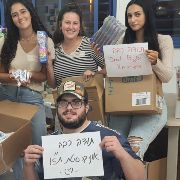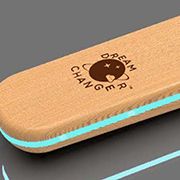Planning for Postwar Israel
TAU hosted a hackathon to tackle the urgent challenges which will persist “the day after” Iron Swords
No one knows when Iron Swords will end, but it is clear that new ideas will be needed to deal with the damage caused to Israel and its citizens. Tel Aviv University students Amitai Mintzer and Nir Komem rose to the task. They conceived and implemented a hackathon, “HackTAU: The Day After,” together with Tel Aviv University’s Entrepreneurship Center. After months with no students on campus, about 230 arrived from 15 different academic institutions along with 70 academic and professional mentors to look for creative ways to solve the various crises facing Israel right now.
The Big Idea
Komem and Mintzer have been close friends since serving in the army together. Komem is an undergraduate student at the Buchmann Faculty of Law and the Interdisciplinary Humanities Program as well as a Rothschild Program Ambassador; Mintzer is an MA student in Anthropology and is in the Adi Lautman Interdisciplinary Program for Outstanding Students. “After October 7th, everyone wanted to do something to help right then and there. We thought, someone needs to plan for what’s next,” said Mintzer.
“As we see it, academia is the ideal venue for this task. The problems we’re facing as a society are huge and we need new ideas to solve them. Academia is in charge of creating new ideas and connecting people with ideas to each other."
Komem expanded: “As we see it, academia is the ideal venue for this task. The problems we’re facing as a society are huge and we need new ideas to solve them. Academia is in charge of creating fresh ideas and connecting people with ideas to each other. And as students, we have to remind ourselves that we are qualified to help. If we’re good enough to fight in Gaza, and we’re good enough to help as volunteers, then our generation is good enough to plan for the future.”
Nir Komem (left) and Amitai Mintzer present their idea on day one of HackTAU. (Photo: Yael Tzur)
The first step was identifying the challenges that needed addressing, so the two contacted as many people from around the country as they could find to ask what problems were most pressing. Six main challenges arose:
Housing and Community: Finding a solution for the hundreds of thousands of displaced citizens from the north and south of Israel, and the urgent need to restore the social ties in these communities.
Education: Adapting educational institutions to the new needs of students and creating a safe space for children and youth.
Agriculture: Leveraging the acute need to rehabilitate the agricultural sector in Israel as an opportunity to integrate innovative solutions in the industry.
Mental health: Developing various programs addressing national trauma and engaging in mental health from a collective perspective.
Jewish-Arab Relations: Creating a vision and plan for a sustainable Jewish-Arab partnership and peaceful co-existence on academic campuses.
Humanities: Focusing on the moral and human crises developing during these times within the region and worldwide.
Komem and Mintzer’s next step was to recruit students to head up each challenge along with academic and professional mentors to help bring ideas to fruition. “It’s like we had six hackathons at once,” says Mintzer.
Thinking Together
One of the exceptional features of the event was the large diversity of thinkers it brought together to innovate for Israel’s future. Students of all disciplines, communities, and backgrounds came from all over the country to form 50 teams. There was even a group of eighth graders who came to observe but in the end were welcomed to participate.
I was blown away by this event—the number of students, the quality of the work, the ideas people brought, and the groundbreaking new ways of thinking.”
“We had here something truly singular,” said Agricultural Challenge student head Itai Rozitzki, who is getting his BA at TAU in Philosophy and Law. He had been on reserve duty for two months and chose to spend three of his rare days off-base at the hackathon. “In every disaster, those who can see the opportunity to improve the world can benefit in the long run. I was blown away by this event—the number of students, the quality of the work, the ideas people brought, and the groundbreaking new ways of thinking.”
Many students already had ideas upon arriving, some with teams already in place, while others came with simply a will to help their country. They were matched up based on ideas and interests with the help of mentors. Komem and Mintzer made sure each challenge had both an academic advisor who could help direct the ideation process, as well as a professional advisor who knew how to put the ideas into action.
One team develops their solution by listening to each other's thoughts. (Photo: Yael Tzur)
Each challenge had two or more teams cooking up different ideas and working in different ways. For example, in the Jewish-Arab Relations Challenge, one group focused on the urgent creation of solidarity in this time of division while the other attempted a more long-term program that could continue during calmer times for years to come.
Said Elinor Shechter, the Hebrew University student head of the Jewish-Arab Relations Challenge, “it’s not uncommon to be a Jewish or Arab student and not talk to each other for the whole year. We wanted to try to mitigate that separation.”
Entrepreneurial Support
When Komem and Mintzer approached the TAU administration with their idea, they were connected with the University’s Entrepreneurship Center. It is considered one of the leading startup accelerators in Israel and has led to the establishment of 18 startups that have raised approximately $155 million. The Center hosts several hackathons a year, including one during the COVID-19 pandemic which culminated in a remote-exam solution that was picked up for commercialization.
"The purpose of the Entrepreneurship Center is to encourage creative thinking and bring students new tools for implementing innovative ideas and projects. All these were reflected in the hackathon."
Said Founder and Managing Director Mr. Yair Sakov, “The purpose of the Entrepreneurship Center is to encourage creative thinking and give students new tools for implementing innovative ideas and projects. All these were reflected in the hackathon. On a personal note, I wanted to support this project because shortly after the war started, I volunteered for five weeks with the evacuees from southern Israel. The close interactions familiarized me with their challenges and needs intimately.
“Strong communities like the kibbutzim are losing people who do not want to return to the Gaza border area. For those who want to return, it is not clear where they will go after their homes were destroyed. The residents of the south who were involved in activities to bring Arabs and Jews together completely lost trust in their neighbors who they helped and fostered friendships with for years. These are exactly the challenges identified for the hackathon. They are core issues for the residents of the south and the State of Israel in general,” Sakov said.
Yair Sakov speaks at the HackTAU final presentation. (Photo: Yael Tzur)
Another integral supporter of the event was Allon Ventures, founded by Dr. Ori Allon. Dr. Allon, who has founded and successfully sold multiple software-based businesses, strongly believes in the positive impact technology has on our world. He is thrilled to support the upcoming generation of innovators who are using their talents to address critical issues.
Unique Solutions
At the end of three intensive days, students from each challenge got up in front of their peers and presented fully-formed projects complete with goals, expected difficulties, and resource needs. “We’re hoping these projects will continue beyond the hackathon, and we’ll be setting up a website for the purpose of connecting professionals in the field as well as possible supporters to the student project creators,” said Komem.
A student from the Mental Health challenge presents her group's solution. (Photo: Yael Tzur)
Added Mintzer, “as a humanities student I feel that academia is where we grapple with tough questions, and where we learn and think about value and meaning. Many people are interested in what will happen after the hackathon, but for me what’s important is that we’re making an academic space where students can take control of their lives and the future of their country. Even though we are all different, we can work together to create the country we want to see.”
You can read about each project in Hebrew here.






